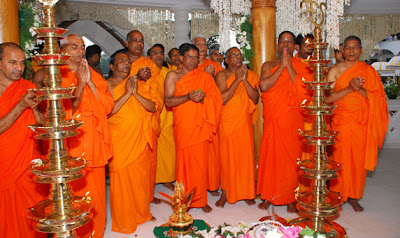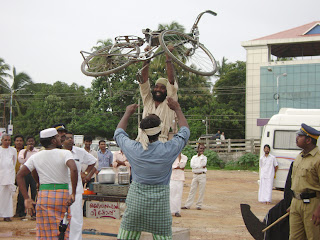India, a land of ancient wisdom and one of the greatest civilizations in the world, should take the lead in preparing a roadmap to meet the challenge of global warming and climate change, the President of East Timor and the 1996 Nobel Peace Laureate, Mr. Jose Ramos Horta, on September 9, 2010.
Inaugurating a three-day International Conference on ‘Global Warming, Climate Change, Sustainable Development and Secular Spirituality’ organized by the Santhigiri Research Foundation in collaboration with UNESCO and the American Center at Santhigiri Ashram, Mr Horta said India should partner with the other Asian countries such as China, Japan and Korea to meet this global challenge and not wait for Europe or the US to act.
Stating that Asia today was a land of resources and skills, Mr Horta said if it displays the vision, the political will and the determination to meet the challenge of climate change, the rest of the world will follow. It was important for Asia to take the leadership as almost half of the seven billion population of the world resided here. The continent was also home to nearly 60 per cent of the world’s poorest, who were the hardest-hit by the dwindling natural resources.
Earlier, in his Presidential Address, former Union Minister of State for External Affairs and former UN Under-Secretary General, Mr. Shashi Tharoor, MP, complimented Santhigiri Ashram for adding the aspect of ‘secular spirituality’ to the debate on global warming. Though a relatively young organization, Santhigiri Ashram had in the past 40 years of its existence acquired a reputation for combining science with spirituality, health with prayers and reflection with human advancement, he added.
Describing spirituality as the quest for the Divine light, Mr. Tharoor said the founder of Santhigiri Ashram, Navajyothisree Karunakara Guru, recognized the light of truth in all religions and was not confined by any particular religious text or doctrine.
Agreeing that all nations needed to cooperate in facing the challenge of environment degradation posed by global warming, Mr. Tharoor however said that there was a “differential” responsibility as the developed nations had contributed much more to global warming than the developing ones. While the US, with a total world population of three per cent produced 25 per cent of the greenhouse gases, India with 17 per cent of the world’s population produced less than four per cent of greenhouse gases.
“The rich countries thus have to make the extra effort to overcome this common challenge. They should make available expensive and clean technology cheap to the developing nations,” he added.
Earlier welcoming the large gathering, including nearly 400 delegates from 20 countries, Swami Navananma Jnana Thapaswi, Director, Santhigiri Ashram, said sustainable development was possible only if there was a change in the human vision and life style to one which was more in tune with the rhythm of nature which was a reflection of the Divine Will. Stating that the process of change had to start at the individual level, the Swami stressed the need for a spiritual master who was a ‘Trikala Jnani’ (the knower of past, present and future) to show the way for individual and societal transformation.
Ashram President, Swami Sathya Prakasha Jnana Thapaswi, and General Secretary, Swami Chaithanya Jnana Thapaswi, handed over a special memento to Mr. Horta.
The Santhigiri Research Foundation has organized the international conference to mark the opening on September 12 of the Lotus-shaped Parnasala (final resting place of the sacred body of Navajyothisree Karunakara Guru), as a symbol of universal peace and fraternity.
Giving an ‘Introduction’ to the theme and objective of the conference, Deputy General Convener of the meet, Dr. Gopinatha Pillai said that it sought to bring on a common platform the two predominant views on global warming – one which held that human activity, particularly industrialization, was responsible for this – and the other which disputed this and said that it was a normal “cyclical” phenomenon.
The conference also sought to bring to the mainstream of the climate change debate the successful model of living practiced at Santhigiri, inspired by Navajyothisree Karunakara Guru, which was totally in conformity with the natural laws and the ‘Dharma’ of the Age.
Delivering a Special Address, British politician and journalist, Lord Christopher Monkton, said that contrary to the general perception about global warming, the world had actually undergone a slight “global cooling” since late 2001. As against the projected rise in global temperature by 1.5 Degrees Celsius, the temperature had gone up by only 0.6 Degrees Celsius, he added. “This talk of global warming is a new form of neo-imperialism,” he added.
In another Special Address, peace activist Mohammad Awad, known as the ‘Arab Gandhi’, said that the world had enough resources to tackle global warming, provided they stopped manufacturing weapons and making wars.
Dr. N. Radhakrishnan, Chairman, Indian Council of Gandhian Studies, lauded Santhigiri for initiating a “global movement for peace and sustainability” and said that the vision of Navajyothisree Karunakara Guru was for a society which was dynamic, realistic and not stuck in ideological cubicles.
Former CBI Director, Mr. D Karthikeyan, expressed concern over the receding of the Gangotri glacier, which he had personally observed during visits to the Himalayas during the past 30 years. There is a need for a judicious use of natural resources, he added.
Mrs. Corinna Y. Arnold, Head, Cultural Affairs, US Consulate, Chennai, expressed the Obama Administration’s determination to implement clean and green technology.
Mr. James Joseph, Chief Administrator, Santhigiri Ashram, gave the Vote of Thanks.
A number of eminent scientists, including Nobel laureates, environmentalists, national level political leaders and policy makers, sociologists, academicians, researchers and experts will attend the deliberations and present papers. Among the noted participants are the founder-president of Science and Environmental Policy Project (SEPP) of USA and atmospheric physicist, Mr. S. Fred Singer, British politician and journalist, Mr. Christopher Monckton, Dr. Richard Falk, Prof., University of California, Dr. K Radhakrishnan, Chairman, ISRO, Dr. G. Madhavan Nair, former Chairman, ISRO, President of World Aquarium, Leonard Sonnenschein, Visiting Professor at the University of California, Ms. Hilal Elver, and Prof. Dinesh Mohan, IIT, Delhi.
The three Plenary Sessions of the Conference would be devoted to the themes of: The Problems of Global Warming and Climate Change; Sustainable Development; Spirituality of Sustainable Development.
The Parallel Sessions during the three days would cover a wide range of topics such as climate change projections for India; Health, environment and sustainable development; Copenhagen and the emerging scenario; Energy – conventional and non-conventional alternatives; Agricultural and food security; Transportation-alternatives; Protecting water resources; Forest conservation; Role of family and spirituality in re-orienting society; Transforming life visions and life styles; Gurupooja and human culture – Santhigiri experience; Sustainable spirituality and sustainable development – linkages.


























